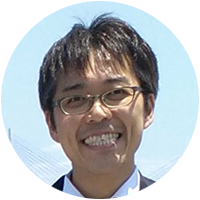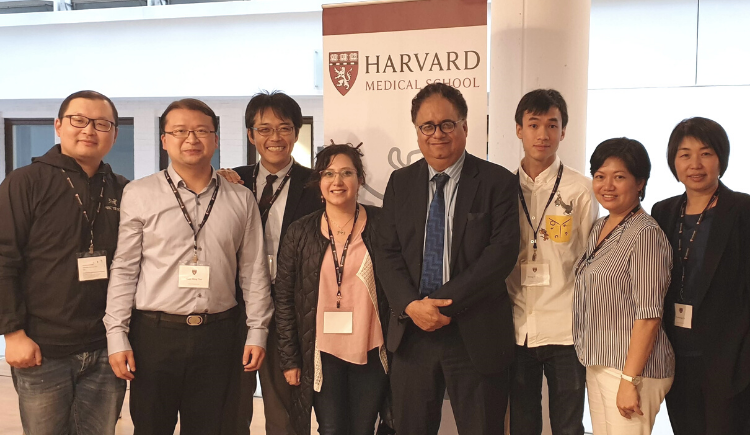Takanobu Nomura | Global Clinical Scholars Research Training
 As a biostatistician in the Medical Affairs department of a Japan-based global specialty pharmaceutical company called Kyowa Kirin Co., Ltd. headquartered in Tokyo, Takanobu Nomura collects evidence to improve the outcomes of daily clinical practice with approved drugs. He also focuses on finding ways to address the most pressing unmet medical needs for patients.
As a biostatistician in the Medical Affairs department of a Japan-based global specialty pharmaceutical company called Kyowa Kirin Co., Ltd. headquartered in Tokyo, Takanobu Nomura collects evidence to improve the outcomes of daily clinical practice with approved drugs. He also focuses on finding ways to address the most pressing unmet medical needs for patients.
But despite having a doctorate degree in biostatistics and undergoing extensive training on the theory of observational research called causal inference approach, he recently wanted to strengthen his management and communication skills in order to increase his overall contribution in the increasingly complex Japanese medical environment. This prompted him to take part in Harvard Medical School’s (HMS) Introduction to Clinical Research Training—Japan. Following completion of this course, he moved on to take HMS’s Global Clinical Scholars Research Training (GCSRT) program. Both programs equipped him with valuable knowledge and skills to help him improve his effectiveness and maximize results.
The Need for New Skills
The mission of the medical affairs department at Kyowa Kirin includes fostering evidence-based discussions with both internal colleagues and external medical professionals in order to explore novel hypotheses for research that could provide new value to society's health. Therefore, Nomura’s goal was to build on his ability to participate in these discussions in a more meaningful way.
“Before I took part in the HMS programs, I often felt that I was unable to collaborate sufficiently with researchers from various fields due to my lack of experience in research management, and because I was not adept at communicating in English,” Nomura says.
He felt that improving his aptitude in both areas would enable him to increase his confidence to find common ground with his colleagues and also to help them find new ways to tackle challenges together. In addition, he wanted to learn how to better describe his part in the research process to his colleagues, as well as find new ways to provide important encouragement to keep researchers engaged and motivated to continue making progress.
Nomura points out that this desire to continue developing his skills and increasing his value in these ways is deeply embedded in his culture—and in the Japanese business model.
“In Japan, business people continue gaining new business skills on an ongoing basis in order to continue to advance their contributions to their position and to the workplace,” he says. Committing to the Harvard programs met these goals in an appealing way—providing a channel to continue developing both personally and professionally.
Tracing the Educational Journey
Nomura’s educational journey with Harvard really began in the summer of 2017, when he first learned about ICRT–Japan from Professor Kunitoshi Iseki, a leading expert in epidemiology and clinical research and representative director of Okinawa-Asia Clinical Investigation Synergy. Prof. Iseki was also serving in an advisory role for several projects in which Nomura was involved.
At Prof. Iseki’s prompting, Nomura applied to participate in ICRT–Japan, which consisted of a six-month learning experience focused on designing and managing clinical research studies.

“Through the coursework, we explored a variety of topics, including epidemiology, biostatistics, Stata programming and study design, as well as ethical issues, scientific communication, clinical trials, and research leadership concepts,” he says. This provided him with a strong foundation to draw on, and in the process, he also built a network of fellow students/colleagues whom he could consult with around common goals.
Taking on Bigger Challenges
Following completion of this program, Nomura decided in 2019 to attend Harvard’s GCSRT, which is a more intensive, one-year program built on a combination of online workshops and in-person seminars (pre-COVID-19) that built on the basics he had developed through ICRT. Both programs have broadened his knowledge. He has also gained a significant amount of confidence on the job with all of the knowledge and new skills he has learned. In the pharmaceutical field, this experience is particularly valuable in order to enable him to have a real impact.
“The probability of success for drug development is extremely low. However, even after going through this difficult path and getting regulatory approval [for new drugs], it is becoming increasingly important and noteworthy to explain whether spending on social health resources is appropriate based on the effectiveness of approved drugs from the perspective of diverse stakeholders, such as patients, health care providers, insurers, policymakers, and society,” Nomura stresses. This makes his improved literacy and communication skills very valuable. “In my view, it’s essential to have discussions and collaborations with a variety of experts, not only for the efficacy and safety profile of clinical trials obtained from drug development, but also to facilitate deeper discussions on the burden of disease, evaluation of treatment value by Patient-Reported Outcomes, ethical considerations for the socially vulnerable people who need treatment and the perspective of health economics,’’ he says.
Bridging Distances among Participants
Nomura also points out that an important part of the HMS continuing educational experience included performing practical team assignments using Framingham and Digitalis research datasets. “These exercises were extremely exciting, allowing my classmates and me to continue lively discussions while mixing what we learned through the lecture with the expertise of each team member,” he says.
Better yet, everyone was able to work closely together despite the fact that they were spread out around the world geographically—with GCSRT class members representing a number of countries and regions, including the UK, Kenya, Philippines, Hong Kong, China, and Mexico.
“Regardless of where people were located, when we worked together it always felt like the other class members were nearby,” he says.
Reaping the Benefits of Advanced Research Training
The experience of the Harvard programs has exceeded Nomura’s expectations. “Before participating, I was worried that I might not be able to be successful; but in the end, I came to the conclusion, ‘I can't love the things that I don't know,’” he says.
“The Harvard Medical School programs have allowed me to think deeply about how to protect the human rights of vulnerable people and how to evaluate alternative treatment options from the perspective of patients and society. They also helped me to acquire the knowledge and wisdom needed to engage in discussions with other team members,” he says.
Nomura recently graduated from GCSRT this fall, and he recommends that others in the medical field make a similar time investment in their own futures. “I sincerely hope that other business people working at companies in the medical field who are struggling to improve their abilities will jump into this opportunity to grow,” he says.
He adds that he is proud to serve as a mentor to other colleagues at his workplace who now are also following in his footsteps to attend ICRT Japan, or GCSRT, and develop their knowledge in exciting new ways.
Learn more about Global Clinical Scholars Research Training. Please note, the Introduction to Clinical Research Training—Japan program has been reformatted into the course offering, Foundations of Clinical Research.
Written by Lisa D. Ellis